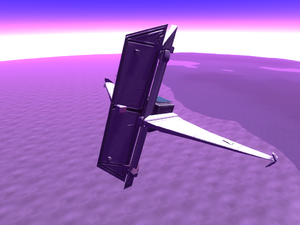Infinite glider

An infinite glider, often abbreviated as infiniglider, is a glider which exploits KSP's aerodynamics and allows a craft to accelerate indefinitely without an engine. Most infinite glider designs use many control surfaces which are flapped very rapidly. It is possible to use infinite gliders on every celestial body with an atmosphere.
Generally, infinite gliders are considered an exploit and not a legitimate game mechanic.
Infinite gliders resemble real-life ornithopters.
Mechanics
Infinite gliders work by exploiting the game's aerodynamics system and the way in which control surfaces interact with the atmosphere. When a light craft is equipped with several, rapidly moving them back and forth causes the airplane to quickly wobble in alternating directions and accelerate, possibly to speeds of 1-6 km/s or higher.
However, infinite gliders tend to experience high g-forces due to the erratic and rapidly changing nature of their acceleration, and can disintegrate if flown too quickly. This disintegration is generally a result of strain from acceleration or atmospheric drag exceeding the physics tolerances of the linkages between parts; to counter it, struts may be used to make high speed gliders sturdier and more stable. Physical time warp, on the other hand, exacerbates the problem. Higher atmospheric density also increases the risk of an infinite glider tearing apart, due to the additional drag produced. The typical optimal altitude for an infiniglider on Kerbin (doesn't explode but moves as fast as possible) is around 0-13000 meters.
Variants
Most infinite gliders are very small craft, equipped with probe cores and solar panels to reduce their weight and hence increase their acceleration. However, manned infinigliders can also be manufactured, either using a command pod or an EAS-1 External Command Seat to hold a kerbal pilot. The latter designs require careful balancing and stabilization due to their typically high center of mass[1].